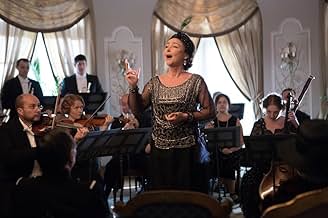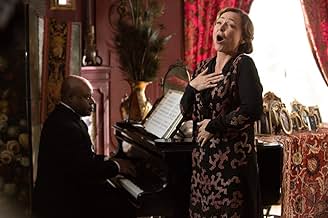Marguerite
- 2015
- Tous publics
- 2h 9m
It is party day at Marguerite Dumont's castle. She sings wholeheartedly, but terribly out of tune. Marguerite has been living her passion in her own bubble, and the hypocrite audience acts a... Read allIt is party day at Marguerite Dumont's castle. She sings wholeheartedly, but terribly out of tune. Marguerite has been living her passion in her own bubble, and the hypocrite audience acts as if she was the diva she believes she is.It is party day at Marguerite Dumont's castle. She sings wholeheartedly, but terribly out of tune. Marguerite has been living her passion in her own bubble, and the hypocrite audience acts as if she was the diva she believes she is.
- Awards
- 7 wins & 15 nominations total
- Director
- Writers
- All cast & crew
- Production, box office & more at IMDbPro
Featured reviews
Placed in Paris of 1920 and inspired by the real life story of Florence Foster Jenkins, MARGUERITE is about a woman who would not let the truth to stand on the way of her desire to sing. Director Xavier Giannoli has a special interest in all things infamous. All his previous films examine the short distance between the infamy and fame and what one is capable of to step into the limelight. His Marguerite is an eccentric with a heart of gold, willfully portrayed by Catherine Frot, the actor whose status in France can only be compared with the one of Meryl Streep.
The movie is emotionally charged and finds a perfect balance between funny and sad. However it is a bit overloaded with characters and not every storyline finds a desirable resolution. With a lengthy running time, and multiple story arcs, MARGUERITE could become a perfect miniseries, which may happen in the future, considering the interest the directors have to Florence Foster Jenkins these days.
A little bit too long, but never boring, MARGUERITE is an exciting film that will hold your attention all the way through – an achievement for any film these days. With an exceptional performance by Catherine Frot, the movie's character study is impeccable and the real reason to see this period drama gem.
Rather than give away too much of the plot; i'd would prefer to sing the praises of the panoply of elements that make this movie so memorable and commendable. It is beautifully staged and executed, with a faithful commitment to the period and a skillfully cast ensemble of actors to back the leading lady. I was especially impressed with Congolese actor Denis Mpunga who lends such a solid and fascinating literal support as Marguerite's butler. Michel Fau steals every scene he is in as an overly hammy opera singer; and Andre Marcon manages to both represent and challenge the archetype of a philandering husband.
While the film does run long; a shade over 2 hours; for the most part it is compelling, intriguing, amusing, sad and thought provoking. How many movies can be described that way? There were moments where I was both laughing and crying; a result of powerful direction by Xavier Giannoli who also co-wrote the film, and of course the impeccable performance from Catherine Frot. There is enormous dignity that the actress conveys as well as a hapless and at times a quiet knowing which is hugely endearing and makes Marguerite neither a victim nor a focus for ridicule. La Frot has such cinematic presence and yet at times there is great stillness to the performance; and of course there is the full bodied musical pieces that anchor the film's structure and themes.
There is a majesty to the film cinematically; and despite a couple of plot strands hastily thrown in and not satisfyingly completed, there is a potency and cogency to the script and to the film's overall running time. I feel it will be one of my favorites of 2016.
Her devoted butler, Madelbos, sees her as she sees herself - a grand opera singer who has performed all the great operatic female roles to perfection. Thus all the care and detail he contributes in her costumes and photos of her as if she actually performed these roles. Since her husband avoids her Marguerite has placed life into Madelbos's hands. Enter the two young journalist who meet Marguerite by sneaking into her estate during a fancy party to raise funds for the War Orphans charity. These two young men are very involved with the post WWI avant-garde movement in Paris and they find Marguerite to be both anti-establishment and uproarious. They write a glowing but tongue-in-cheek review of her singing. She reads it and is so taken with these two young men she befriends them and they in-turn introduce her to the underground art movement in Paris at that time. These people accept her as a performance artist and take her to heart.
So now Marguerite finds herself in two worlds, 1. The established moneyed society which patronize her and 2. The avant-garde art underground youth art culture. She experiences happiness, ambition, and excitement. Of course all this comes crashing down around her and she breaks under the reality. Her husband learns the hard way that he really loves her but it is too late. Her butler Madelbos could see this eventual end and is prepared to capture this bitter sweet moment.
What a wonderful movie, story, vision, Xavier Giannoli has brought to the screen. A delight to see, maybe painful to hear at times, but your heart will ride with Marguerite through her highs and lows, and be broken along with her friends that believed in her.
Bravo!!!
Did you know
- TriviaThe name of the title character is a gallicised form of Margaret Dumont, the dignified lady with the figure of an old-time opera singer who was the foil for the Marx Brothers' gags.
- GoofsPlaced in Paris starting from September 1920, and with an almost faithful commitment to the period, except for the sequence when Marguerite, Baronne Dumont sings whilst motion picture images are first projected onto a white sheet and then onto her white clothing. Incorrectly there is the use of a 16mm silent movie film that appears to be projected from a 16mm film projector, however 16mm film was not invented by Eastman Kodak in the USA until 1923. In France in 1922 Pathé Frères invented their 9.5mm silent movie film as part of the Pathé Baby amateur film system, which would have been more likely to be in use in this era.
For the era the incorrect number countdown leader is projected, and any fully trained projectionist would notice the error, and in 1920 we see the 1965 "SMPTE Universal Leader" that was designed and used for television projection applications. Featuring a continuous countdown from eight to two (measured in seconds, rather than feet), with the numbers in the center of a target with two white circles and a rotating "clock arm" animation. "SMPTE Universal Leader" did not gain widespread acceptance theatrically which still used from 1930 "The Academy Leader", and from 1951 "The Society Leader" (both are 16 frames/foot in 35mm film), counting down from eleven to three, and a quick beep is heard at three, with all the numbers appearing upside down. The words 'SIX' and 'NINE' usually appear below their respective numbers.
The Academy leader is specified by SMPTE 301.[1]. The Universal Leader is specified by ANSI/SMPTE 55.
The Society [aka All-Purpose] Leader (1951) is quite complex in design, and is recognizable by its circles with slender arrows pointing to the sides, top, and bottom of each frame (akin to cross-hairs). The numbering is from 11 to 3, but oriented the correct way up, however the SIX and NINE appear as words only. The numbers are again spaced at one foot intervals, i.e. at every sixteenth frame, with 'echoes' of each number in the immediately adjacent frames (so each number actually appears thrice). The Universal [a.k.a. Television] Leader (1965) is the most widely recognized with the familiar 'clocksweep' animated graphic, and the numbering used is from 8 to 2 and with duration of precisely 8secs@24fps. All numbers are the correct way up, and are spaced at 24-frame (1 second) intervals. Since the number 9 has been eliminated, the 6 appears only as a numeral.
- Quotes
Félicité la barbue: [Referring to Marguerite] There are only two ways to deal with life: dream it or live it.
- ConnectionsReferenced in Florence Foster Jenkins (2016)
- How long is Marguerite?Powered by Alexa
Details
- Release date
- Countries of origin
- Official sites
- Languages
- Also known as
- Madame Marguerite
- Filming locations
- Production companies
- See more company credits at IMDbPro
Box office
- Budget
- €8,000,000 (estimated)
- Gross US & Canada
- $506,677
- Opening weekend US & Canada
- $19,924
- Mar 13, 2016
- Gross worldwide
- $8,754,356
- Runtime2 hours 9 minutes
- Color
- Aspect ratio
- 2.35 : 1
Contribute to this page
































